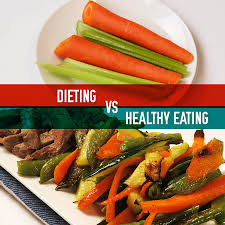So why are fewer people going on weight loss diets? One reason, some experts say, may be that they have learned from past mistakes.
Diet books, low-calorie, fat-free, and sugar-free foods abound, but don’t appear to be making a dent in obesity statistics. Many dieters have been lured over and over again by promises of fast weight loss from the latest diet schemes, only to regain the lost weight — and then some — as soon as they go off the diet.
The truth is that if your weight loss plan is not sustainable for the long term, it’s not worth following!
Another reason, say experts, may simply be that dieters are waiting for the next diet craze – the Atkins Diet or South Beach Diet of the moment.
There’s no single, super-popular diet right now, says Cindy Moore, MS, RD, nutrition director for the Cleveland Clinic. “Even when the hot diet bursts onto the scene, just reading it is no guarantee you will lose weight,” she adds.
Still another reason, some say, is that, with two out of three Americans overweight, overweight is fast becoming the new “normal.” When your friends and family are overweight, your own extra pounds can seem less important.
Indeed, a 2007 study in The New England Journal of Medicine found that people tend to follow suit when their friends and family members become overweight, and likewise when they lose weight.

Trends like the “slow food” movement, an interest in organic foods and in eating foods grown closer to home (being a “locavore”) are further shifting the momentum away from foods to avoid to foods to enjoy.
“If you shop at farmers markets, you are going to be buying natural food, not junk food,” says Moore.
K. Dunn Gifford, president of the Oldways Preservation Trust, a food issues think tank, says high-quality food is just more satisfying.
“We need to reduce our tendency toward over abundance and realize less food can be more satisfying when you choose foods with intense flavors and taste,” Gifford says.
It can be a lot easier and more motivating to focus on what you can eat instead of what you should avoid, experts say.
A study published in The American Journal of Clinical Nutrition in 2007 reported that obese women who avoided high-fat foods and focused on eating more fruits and vegetables lost 20% more weight that those who only avoided high-fat foods.
So what exactly should you be adding to your diet? Go for more plant foods and whole, unprocessed foods that are rich in nutrients and naturally lower in fat, salt, and sugar, experts say.
Nancy Rodriguez, PhD, RD, a nutrition researcher at the University of Connecticut, says eating lean or low-fat protein at every meal will fill you up and make you less likely to overeat. Likewise, foods like whole grains, fruits, and vegetables — high in fiber and water content — are low in calories and help you feel full.
Source: http://www.webmd.com/diet